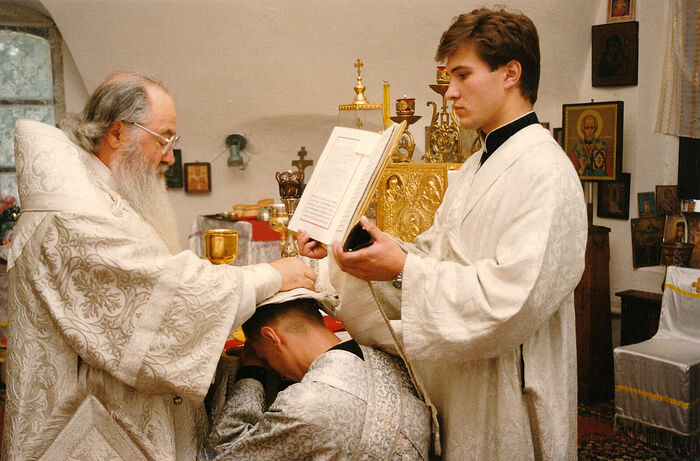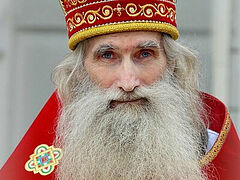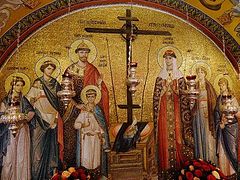The St. George the Victory-Bearer Church on Poklonnaya Gora is associated with military glory, and this year it celebrated many significant events, including the 75th anniversary of Victory in WWII and the 25th anniversary of the building of the Church of St. George to commemorate this victory. Moreover, this year the church’s priest, Seraphim Nedosekin, celebrated his milestone birthday. In our interview, we asked him how these Heavenly and earthly Christian warriors can help us overcome the problems of this world.
Just desire to serve God, and God will take care of everything
 Archpriest Seraphim Nedosekin. Photo by Dmitry Kiryukhin —Fr. Seraphim, are there any stories in your family history that show how with God’s help people of the twenthieth century managed to withstand persecution, just as the early Christians and St. George the Victory Bearer faced the challenges that God chose to give them?
Archpriest Seraphim Nedosekin. Photo by Dmitry Kiryukhin —Fr. Seraphim, are there any stories in your family history that show how with God’s help people of the twenthieth century managed to withstand persecution, just as the early Christians and St. George the Victory Bearer faced the challenges that God chose to give them?
—Upon hearing God’s call, all Christians will follow their hearts and answer His call. These opportunities to confess our faith are presented to us all the time. Even the recent history of our Church has plenty of examples of people confessing the faith and suffering martyrdom for the sake of God. We have a multitude of new martyrs and confessors of the Russian Church who are praying for us, that we would remain steadfast in the Truth.
Just like them before us, we view the deeds of Great Martyr St George the Victory-Bearer as a vivid example of confessing Christ. St. George was only 18 years old when he embraced the Gospel verse, “Greater love hath no man than this, that a man lay down his life for his friends.” (Jn. 15:13). This is what this is all about—no matter what path a Christian chooses in this world.
One of our relatives, my grandfather Parmen’s grand uncle, was a schema-archimandrite. He was one of the fathers-confessors in Solovki Monastery. This was well before the revolution of 1917. Our grandmother Valentina even used to visit him on the Solovki Islands. Then the authorities started closing the churches down, and in those turbulent times the family began to lose their faith. Although one of our lateral relatives, Theodore (he was a priest) was given the title of New Martyr (commemorated on April 17/20). My grandfather and grandmother lived in Novoselitsa Village of the Syamzhensky Region of Vologda Province. When in the 1930s the authorities started exiling believers to that area, my grandparents took in a noblewoman with her son. The boy was the same age as my father, who was about four or five years old back then. This woman—her name was Afanasiya—taught the Law of God to my grandparents before they moved to Yaroslavl. The Soviet-Finnish war started, and my grandfather joined the army. Then World War II broke out. During the war my father, then a teenager, was working on the railroad. The trains were regularly attacked by bombers. Perhaps at that time people didn’t have any sophisticated knowledge of religion, but they couldn’t help but pray in these dire conditions.
 Archpriest Vladimir Nedosekin holds 3-year-old Seraphim in his arms. Shelkovsky Region of Moskovskaya Province.
Archpriest Vladimir Nedosekin holds 3-year-old Seraphim in his arms. Shelkovsky Region of Moskovskaya Province.
After the war, my parents once walked into the Elokhovsky Cathedral Church near the Baumanskaya subway station in Moscow. When my father heard the singing, he understood that it was something he had known since childhood, for he remembered all the troparions by heart. He came closer to the solea, and when the priest came down from the altar after the service, my father asked him how to learn all that so he could serve God too. The bishop (my father realized that it was a bishop because the priest wore a “round icon” on his chest) referred him to Novodevichy Convent where they had a theological school during the war. When my father rushed there, he was told that the school had been transformed into a theological seminary and transferred to the Holy Trinity-St. Sergius Lavra. So, he went to the Lavra to file his application. At first, they didn’t admit him, as he hadn’t brushed up on the knowledge he received when he was a child. Later, through God’s Providence he was admitted to the seminary.1 That was how God Himself guided the one who wanted to serve Him.
 The Holy Trinity-St. Sergius Lavra. Seraphim Nedosekin is 9 years old. It is known that all that will live godly in Christ Jesus shall suffer persecution (2 Tim. 3:12). This is especially true for those who serve God. The authorities were chasing my father from one parish to another. I know that the security officers even put a gun to his head, trying to persuade him to work for them. But he never even asked for time to consider the offer. He refused right away, and they chased him further, creating unbearable conditions and trying to get rid of him. But my father fought for every church till the very end. The authorities couldn’t shut down any of the churches where he served. He always spoke the truth no matter how bitter it was. His motto was, “Speak the truth and then bear the consequences”. Such people are not liked.
The Holy Trinity-St. Sergius Lavra. Seraphim Nedosekin is 9 years old. It is known that all that will live godly in Christ Jesus shall suffer persecution (2 Tim. 3:12). This is especially true for those who serve God. The authorities were chasing my father from one parish to another. I know that the security officers even put a gun to his head, trying to persuade him to work for them. But he never even asked for time to consider the offer. He refused right away, and they chased him further, creating unbearable conditions and trying to get rid of him. But my father fought for every church till the very end. The authorities couldn’t shut down any of the churches where he served. He always spoke the truth no matter how bitter it was. His motto was, “Speak the truth and then bear the consequences”. Such people are not liked.
Our large family (our parents had six children) spent a lot of time on the road. We often didn’t have a roof over our heads, as we had to move from place to place. We endured these hardships along with our father, and sometimes it was almost as in the Gospel—we had nowhere to lay our heads. (Cf. Matt. 8:20). My older siblings remember particularly well that we had nothing to eat. But there were always some kind people who helped us.
God was also comforting us. It is said that “where sin abounded, grace did much more abound” (Rom., 5:20). My father was friends with many elders and hierarchs and corresponded with them. At home, we have the letters he received from Metropolitan Pitirim (Nechayev). We visited many sacred sites and talked to elders such as Fr. John (Krestyankin) and Fr. Adrian (Kirsanov) in Pechory. Later, my parents settled in Zagorsk. There we went to confession to Fr. Kirill (Pavlov) and Fr. Naum (Baiborodin). We became parishioners of the Holy Trinity-St. Sergius Lavra. Mother kept taking us to Moscow to visit the miracle-working icons of Theotokos, especially on their feast days—we went to Renewal of the Resurrection Church in Uspensky Vrazhek, the Elokhovsky Cathedral Church, Novodevichy Convent, the Resurrection Church in Sokolniki and other churches. We attended services celebrated by patriarchs and bishops. On all great feasts, my siblings and I went to Church, skipping school. This didn’t affect our studies. We all had good grades.
This is the true The Internationale!
—Did you, as priest’s children, experience any pressure at school in Soviet times?
—Of course, we did! Life is always testing you. None of us joined the Little Octobrists or the Pioneers.2 This upset the school authorities, but when we knew that they were taking all students to the Little Octobrists or the Pioneers initiation ceremonies, we simply skipped school. My homeroom teacher was a believer. Once she told me not to come to school on a certain day. I didn’t even know why. She also found a way to send a note to my mother about it. Only when I got home, I learned that on that day they were going to have the Pioneers initiation ceremony.
 Playing the grand piano in Grade 6 Although in all other matters, we tried not to stick out. We got along with our classmates very well. When we had to form groups of five (called “the stars”) to clean the classroom, we would simply join the group that had more of our close friends.
Playing the grand piano in Grade 6 Although in all other matters, we tried not to stick out. We got along with our classmates very well. When we had to form groups of five (called “the stars”) to clean the classroom, we would simply join the group that had more of our close friends.
When my older siblings went to school, they were forced to learn The Internationale3 by heart. Once Olga, our eldest sister, was told to recite The Internationale. The teacher specifically called her first because she was a priest’s daughter. “Can I sing it?” Olga asked. We all had an ear for music, as we attended music schools… “Okay, you can sing,” the teacher said. And Olga started singing at the top of her lungs: “I believe in one God, the Father Almighty…”. Can you imagine this happening in the 1960s! The teacher was shocked. After that, our parents had to attend many meetings of various committees. The authorities threatened them with annulment of parental rights because they thought that our parents weren’t bringing up their children properly…
—What helped you in such difficult situations? Prayers?
—Naturally, people’s first reaction in a difficult situation is panic. Then they understand that God has the power, and they must rely on Him. When faced with difficult problems, we rushed to see our spiritual father, no matter what time of day or night it was and asked for his blessing and prayers. We prayed too. In extreme situations, you can get confused, but after you speak your mind in conversation with your spiritual father whom you love, respect and trust, you get some kind of tranquility and stillness in your heart. Then you fully rely on God’s will. And God won’t abandon you.
We saw these examples when we were children and grew up, absorbing these experiences
Thus, “from strength to strength” (Ps. 84:7) you go on, learning not to lose your temper at the slightest provocation and to maintain solemnity, calmness and composure—these are the qualities that God likes. “O gladsome Light of the holy glory”…4 On such quiet evenings, with family prayers raised to God, the Most Holy Theotokos, and the saints, all problems are resolved. When faced with a serious situation, my parents would always start reading Akathists to St. Nicolas or the Kazan Icon of the Mother of God. They would pray for 40 days, and help would come.
We saw these examples when we were children, and we grew up absorbing these experiences. While our parents were alive, we rushed to them and asked questions just like we rushed to elders for advice. Our parents instructed each of us differently, as they saw the differences in their children’s characters. Now that our father and mother have passed away, we remember them in prayers we raise in difficult situations. We communicate with them through prayer. Just like our parents did in their time, we rush to see elders and spiritual advisors when we are faced with challenges and sorrows. After receiving their advice, we calm down and realize that they told us exactly what our parents had taught us! You can’t deviate from the path.
What did they teach in English classes?
—If you are shown this path in a correct way. Do you share this experience with those who come to you asking for your advice as a priest?
—Yes, but it is somewhat different nowadays. It seems that we have freedom of religion. You can make the sign of the cross when you pass by a church, and nobody will say anything to you. I remember what happened once when my father was a priest. A man from the city administration brought a baby for baptism and on the way out of the church ran into one of his coworkers. This coworker then reported this man to the authorities. Can you imagine, that person had also come to church, yet he reported someone else. That was the way it used to be—those who were the first to write a report had a better chance of success.
—Fr. Dimitry Smirnov used to say that even nowadays there is a lot of reporting: People complain to the Child Protective Services and they take the children away from their parents…
—That time the authorities called my father, and he said that that man had come to the church to discuss some issue regarding the church’s land plot, and there were no repercussions for that man.
—So he covered up for the man?
—Yes.
—Did you discuss this matter at home? Was this person a believer only formally, if he came to church himself but still decided to report on his coworker?
—Well, father told us this story only many years later. He kept many things to himself. He shared them with mother, perhaps. But even if you are just a kid playing with a toy car under a table, you still hear things, and they are imprinted on your memory. The older we got, the more cognitively we perceived these adult conversations. The only thing we were warned about was that we weren’t supposed to discuss the things were heard at home elsewhere, or they would be consequences. We ourselves felt that the teachers were prejudiced against us.
For example, my English teacher was giving me such a hard time! She would spend fifteen to twenty minutes, which was practically half of the lesson, discussing our family.
—Well, it is a good topic for a lesson! If it is presented properly.
—But she was presenting it from the point of view of the Soviet agitprop. “You do want to be like the others, don’t you? Don’t you want to become a Pioneer?” she kept asking me. Once she even attempted to put that red piece of cloth5 on me by force. Earlier, she tried the same methods of persuasion on both of my older sisters. They didn’t learn English in her classes— instead of English this teacher’s actions taught them how to withstand confrontation and steadfastly confess their faith. That teacher was just honing her bullying techniques on us.
When a teacher is picking on some student, there are always other students who are eager to pile on. In elementary school they teased me by calling me “popyonok.”6 Then a certain movie came out—I didn’t see it because we never had a TV in our family—but suddenly in high school they started calling me “Father Arseny” [after one of the characters in the film].
 At Diocesan Administration with Vladyka Eusebius, Pskov
At Diocesan Administration with Vladyka Eusebius, Pskov
—At that time, the situation with movies and cartoons wasn’t as bad as it often is nowadays…
—When we kids wanted to watch some cartoons—for example Winnie the Pooh had just been released—we would go to our friends’ place. I remember they were showing an episode at certain time every day. But these cartoon-watching sessions didn’t happen very often.
Your family is your rearguard
—You touched upon the problem of bullying at school, which sometimes continues as workplace mobbing. What is the solution?
—It is very individual and depends on the personality of the child being bullied and the lines that the bullies are willing to cross. What supported me was that my parents spoke a lot to me at home, explaining everything and helping me understand what was happening. Your family is your rearguard. Even if this didn’t happen with you, but with your peer, you ran to you parents and asked them—because in a violent situation a child experiences a shock and doesn’t know what to do.
It is important that parents do not brush their children away; they must talk to their children, explaining everything and helping build relationships with others. The parents must use their experience to predict the development of the situation. I remember them teaching me, “If you see that everybody is against someone, come to this person and offer him or her a helping hand. Even if everybody is laughing at you, you do it anyway.” This helps you build your character and makes you stronger.
If you see that everybody is against someone, come to this person and offer him or her a helping hand
I went to some classes feeling like it was torture, dreading what was to follow…
—Being “broken on the wheel” [like Great Martyr George]
—Well, yes, figuratively speaking. They could start grilling you when you’re not ready. At least, we didn’t misbehave. Our parents were never called to the principal’s office for that. If some of our classmates started doing something wrong, it never got us drawn in, as often happens with children when one starts doing something, and the others follow suit… Internally, I always distanced myself from aggression: I knew that it was bad and that I shouldn’t behave like that. And later, as I grew up, when I saw the double standards that many people live by, it wasn’t acceptable to me. I always felt dishonesty and rejected it.
The regime’s hidden agenda
For example, when that English teacher was praising Lenin and telling us how good it was to have his image on the star-shaped lapel pin on one’s chest, we knew that it was idolatry. We knew it from a young age. When I was a teenager, I came across a book in our school library that clearly stated that the Soviet authorities gave an order to destroy an entire settlement. I took this information to my parents. We trusted teachers too, unlike nowadays when students may even threaten their teachers. We still had respect for our elders. At the same time, we had to be careful too, just in case… When I was in Grade 6 or 7, I realized for the first time that the regime had a hidden agenda—the authorities said one thing but in fact everything was totally different.
 Serving as an assistant deacon in Metropolitan Juvenaly’ church
Serving as an assistant deacon in Metropolitan Juvenaly’ church
—What kind of book was it?
—I don’t remember, it was an old one, with yats7.
—Volnyi Strannik publishing house recently published Georgia Briggs’s anti-utopian novel Icon. The librarians there were moving the books around during inspections to save the books that told the truth.
—This is similar to what we had during the Soviet times. Although, we had already heard many things in passing from guests of our family. The taste for truth had been cultivated in us from an early age. Later, when I was in high school, there were some changes for the better in the country. In the past, people used to copy the Bible and Gospel by hand and pass the copies around. Then, on the occasion of the 1000th anniversary of Christianization of Rus, the Bible was officially re-issued. My homeroom teacher (it was a different teacher now) asked me, if it was possible to get a Bible. I told my father about her request, and for my graduation ball, he brought a three-volume edition of A.P. Lopukhin’s “Tolkovaya Bibliya” (The Bible Explained) for all our teachers.
The taste for truth had been cultivated in us from an early age
My English teacher had retired by that time.
—Enough about the teachers. But how did your classmates treat a believer in those times?
—Children see how you treat your friends. They see that you don’t turn away from somebody even if that person hurt you, and if the person who hurt you is in need, you help. Many people never saw this anywhere else. Maybe at first they joked about our family, but true colors are eventually shown and then everyone can draw their own conclusions.
Now the reality has another aspect—the virtual one
—It is an axiom for Christians. The morality is inherently religious. Without God, everything would fall apart. Didn’t the twentieth century clearly demonstrate this once again?
—I was very lucky to have my parents. They were true believers and taught us children to follow the Commandments from a young age. Of course, it is more difficult for those who didn’t know all this from an early age. Our parent’s advice and our respect for them helped us avoid many mistakes. Nobody forced us to do anything, but mother would occasionally mention that, naturally, she would like it if we all decided to serve God. And that was exactly what happened—one of my brothers is a bishop, two are priests, and all three of my sisters are married to priests. Many things that our parents taught us are still helping our families.
 Archpriest Seraphim Nedoseki at the evening service in St. George’s Church on Poklonnnaya Gora. Photo by: Dmitry Kiryukhin
Archpriest Seraphim Nedoseki at the evening service in St. George’s Church on Poklonnnaya Gora. Photo by: Dmitry Kiryukhin
Although, the times have changed. Digitization has begun. This is an estranging factor. In many families, parents have lost contact with their children. We used to run to our parents for advice, while nowadays kids can google the answers using their smartphones, and there’s no way of knowing what answers they will find on the Internet… It is okay if they have at least some way of telling good from evil—otherwise they are simply enslaved by these torrents of destructive lies presented in an entertaining wrapper. Children are alienated from their parents and teachers, let alone their grandparents.
—Does a large family prevent such problems?
—Yes, the environment itself teaches you: you might want to spend some time on your smartphone, but you are always distracted by either your younger siblings demanding attention or by the older ones telling you something. There are many things that you do together. For parents, it is important to establish the relationship between the siblings correctly so that they would not quarrel; otherwise they will go different ways in life.
We were always taught to see the best in each other. Especially the younger ones were taught to respect the older ones. Our parents spoke with the older children individually, correcting some negative features of their character. “The young ones are looking up to you!” they would say to us. And the younger ones would be trying not to let the older siblings down. Family is a very serious resource for raising responsible children. It is the school of love and unity, the school that protects you from troubles.



